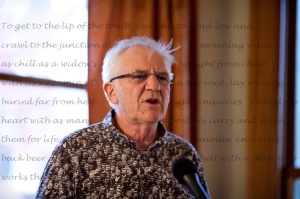
Pandora at work, Iowa House Hotel, IWP, October 2012.
In his 1980 Nobel Prize for Literature acceptance speech, the great Lithuanian poet of the Polish language, the expatriate Czeslaw Milosz had this to say about the politics of poetic exile, actuality and what he terms the poet’s true vocation, the contemplation of Being:
“Only if we assume that a poet constantly strives to liberate himself from borrowed styles in search of reality is he dangerous. In a room where people unanimously maintain a conspiracy of silence, one word of truth sounds like a pistol shot. And, alas, a temptation to pronounce it, similar to an acute itching, becomes an obsession which doesn’t allow one to think of anything else. That is why a poet chooses internal or external exile. It is not certain, however, that he is motivated exclusively by his concern with actuality. He may also desire to free himself from it and elsewhere, in other countries, on other shores, to recover, at least for short moments, his true vocation—which is to contemplate Being.”
Coming from a writer who survived the twentieth century’s twin totalitarianisms, this is a pronouncement worthy of some reflection. Milosz had seen what Hitler and Stalin had done to writers, and the choices they were confronted with under the Nazi heel and the Communist fist.
Many were cowed, co-opted and silenced, others spoke up and paid the price – yet he seems to be saying that something other than resistance or collaboration with worldly power is the real calling of the writer. What does he mean, to “contemplate Being?”
For someone so worldly wise, it sounds airy-fairy, but in fact, it is all we really have. Poets it seems to me, work best when they realise that they are their own experiments in humanity; from within and without, they are always processing the results of that internal encounter with the infinite self and the infinite universe, through language.
How could we not be moved by living in space and time, immeasurable and incomprehensible, yet crying out for our answers? For those who take this journey – the real dangers to power – there is no hiding place, as the self is mortal and flawed, while the world is transient and unstable, ephemeral.
Yet not only do poets attempt an answering call, a conversation within, from limits into the illimitable, they also attempt further adventures by translating each others’ works – so often described as a process that cannot succeed, because a poem in one language cannot truly be reproduced in another.
Watching Pandora, a Burmese poet translating my English poems, “As big as a father” and “The departed” two days ago, I had a chance to think about all this up close.
One poem is about an absent father, the other concerns grief for kamikaze pilots – both subjects well within Milosz’s scale of contemplation, however well or badly I may have brought them off. Looking at the Burmese script on Pandora’s laptop as we discussed a range of meanings for “big” and “skiff”, I had a weird sensation somewhere between delight and awe.
And not just because they were my poems, but because, I think, here was one experience of Being moving into another realm, as new poems were created based on the English originals. “As big as a father” will now belong to anyone in Myanmar who wants it, as will “The departed”.
Myanmar is a country as we all know with a famously harsh attitude to any dissent, let alone poets who want to think and BE outside the square. How can I expect any Burmese reader to identify with the grief of the families of kamikaze pilots – such men belonging to an order of being so radically dehumanised that it is hard to know where to start?
Yet grief is a universal experience that finds expression in every language, from the deepest wracking sob to the the most elevated elegy. “Sobbing” was a word Pandora and I discussed at length; it is the strongest English word for the bodily expression of grief, I think – and she has to find the Burmese for that.
She will, because her people know about sobbing, and they grieve as we do. The joy and the power of a good poem, of the few truly great poems, is that they give back to us some precious spaces to contemplate our own Being, away from exile, alienation and actuality.
In giving me this gift, Pandora has opened a kind of box which is the very opposite of that of her namesake – and of course, she has another name, which is untranslatable. She has opened my world into Burmese and so taken me, mysteriously, into hers.

Reading at Shambaugh House, 17 September, 2012. Photo credit: Greg A. Bal.
No comments:
Post a Comment